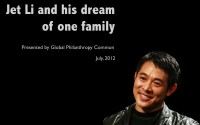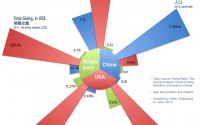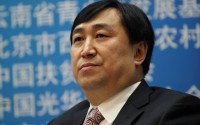Interview with Alice Lau (2) A Journey of Continuous Learning
For those who are not familiar with Alice Lau, she is a well-respected leader in Chinese philanthropy. She led a delegation of leaders in business and nonprofits on a study tour to Boston in December 2013. I had the privilege of working with the group and interviewing Alice Lau. I’m writing up the interview in 3 parts. This is part 2: A Journey of Continuous Learning. You may continue reading: Part 1: Finding Mission and Part 3: Belief in Civil Engagement.
Alice Lau’s Theory of Joints from Global Philanthropy Common on Vimeo.
H: Let’s talk about your experiences after you went back to China. Were you able to apply what you learned in the States?
A: The beginning was very frustrating. My first position back to China was at the Institute of Civil Society at Sun Yat-Sen University. One of my major challenges was I had never worked at any nonprofit organization in China before studying in the States, while my learning in the nonprofit field was all about NPOs in the States. The memory is still vivid. I returned to Guangzhou on January 13, 2006, and was invited to the annual meeting of China’s Grassroots NGOs the very next day. I was reckless enough to offer a lot of thoughts and advice, based on what I’d learned abroad, but only saw people roll their eyes. I felt totally out of place there.
I was both frustrated and lost, and started wondering whether I should go back to business, which at least, was a familiar arena. Again and again, I asked myself, “Do you really want to go back?” Deep down, my answer was always No. Then it became obvious to me that I had to adapt.
H: How long did this period take?
A: About half a year. These were struggles I had never experienced before. I grew up in an affluent family where my father was a Party official, and hadn’t had much access to people at the bottom of the society before switching into the nonprofit sector. When I started working with people from grassroots NGOs, the shock was so enormous that I felt uncomfortable and even resistant. I could hardly understand what they were talking about, and vice versa.
But once I’d made up my mind to adapt and accept, things began to change, and I started to learn to look at the people with refreshed eyes. Many of them were about the age of my son, and the hardships they were experiencing were 100 times tougher than the obstacles I encountered. Looking back, I realize the initial energy that pushed me forward in the nonprofit sector came from these people who would never give up.
H: How did you work with them?
A: At The Institute of Civil Society, our mission is to support the development of Chinese civil engagement through research and training programs. We work closely with grassroots NGOs. Later I founded a community foundation so that we could channel more resources to support the NGOs. After that, we established School of Philanthropy at Sun Yat-Sen University. We expect these institutions, collectively, to serve as a robust engine for civil engagement in southern China, supporting grassroots NGOs with research, resources and capacity building.
As for myself, besides working with these institutions, I became a member of SEE, a Beijing-based environmental organization, in 2007. SEE has attracted a large number of prominent entrepreneurs of China. In 2011, Wang Shi invited me to be the Executive Director of SEE. I declined, as I was totally happy with my work in Guangzhou and the challenge of managing some of the most influential business barons in China seemed too overwhelming. Wang Shi was extremely persistent, and he would call me every day. In the end, he stroke me by asking, “What was your purpose to spend two years abroad, working so hard? Isn’t your goal to help develop the civil society in China? Don’t you think SEE is a great platform to engage resourceful entrepreneurs to support the civil organizations in China?”
So I took that position, and packed with me a learning mentality. I gave my best shot for everything, and have learned a lot along the way. I have been in the position for 3 years, and I think SEE has made some substantial progress in the last few years.
H: You’ve worn different hats in the nonprofit sector, a volunteer, a leader, a researcher. Among all the roles, which one do you like the best?
A: [pondered a little bit] I actually like all the roles. When I started as a volunteer at the Lions Club, I was very happy. I remember leading teams to remote mountainous villages to give free cataract operation to the elderly there. They would hold my hand, talking in dialect, which I couldn’t understand at all. But the warmth from the hands would reach my heart. I felt like holding hands of my parents. The warmth and the sense of connection are very important to me, which is not just satisfying, but empowering. Without such experiences, I would not have become who I am today.
The satisfaction from leading an organization comes less direct. It is from the growth of the organization and the people in the organization. At Lions Club, I started out as a club president, and now I’m leading the national council. I am further and further removed from direct services. Instead, I have been doing more supportive work, such as training, and no longer see immediate results from my efforts. But when I see more people are attracted to Lions Club, and they have grown in their charity work, I feel like I have contributed my part. I can imagine it, and I believe in it. Sometimes I do think you’ll need such imagination and beliefs in philanthropy, especially when you are running behind the stage. What matters the most is not my personal touch, but the changes I would like to see in this society.
H: Looking back on this journey, what else have you learned?
A: When I reflect on my own changes, I realize I’ve grown the most when I pursue a goal larger than myself. Business environment can easily push people to be very dominant, especially for business owners, as you have to take full responsibility for the success and failure of your decisions. I was like that. But this way won’t work in a voluntary organization. People are driven by a shared mission, not by authority. When I took the leadership role at Lions Club, I began to learn to surrender, to compromise, to listen, and to attract more people to achieve our goals together. The experiences at the Lions Club changed me, and I was able to further the learning to other organizations I work with. I think this is the most important gain I’ve had from my charity work.
H: So, what’s next?
A: I am happy doing whatever charity work. I would be even happier if there’s opportunity that will lead to a higher leverage of impact.



